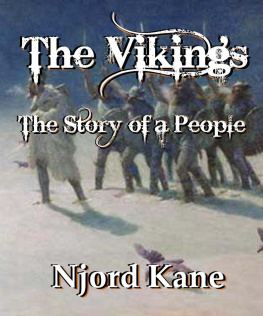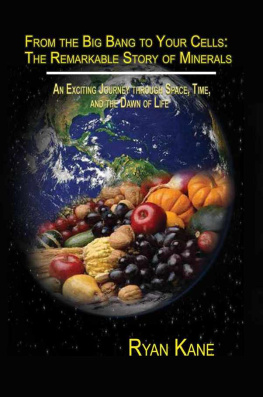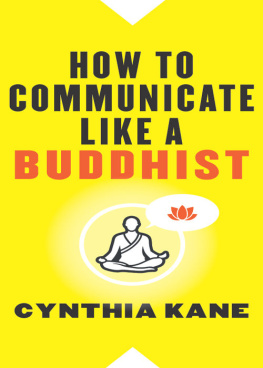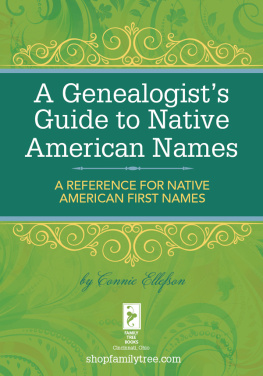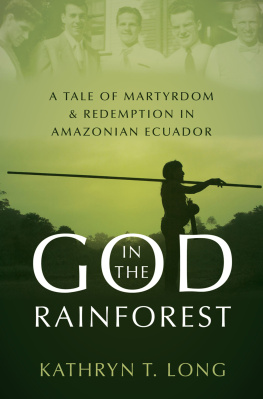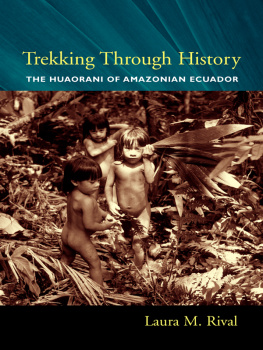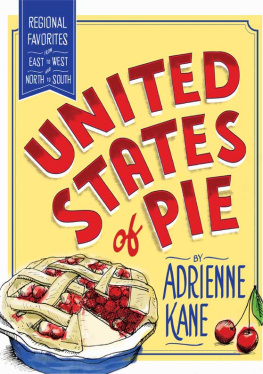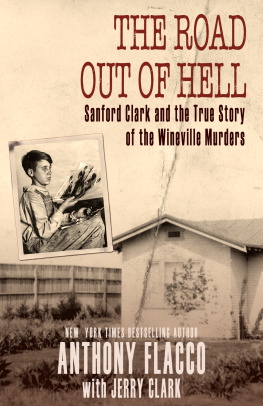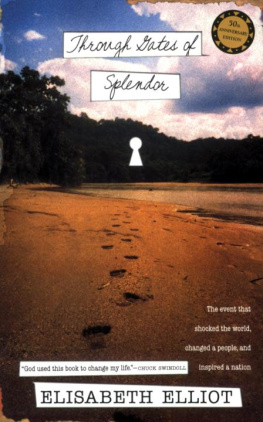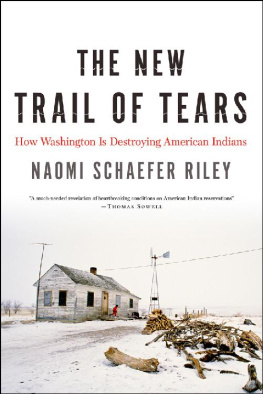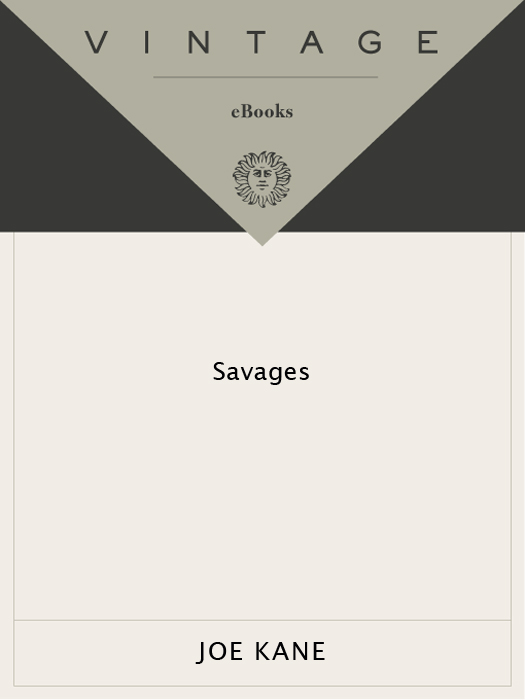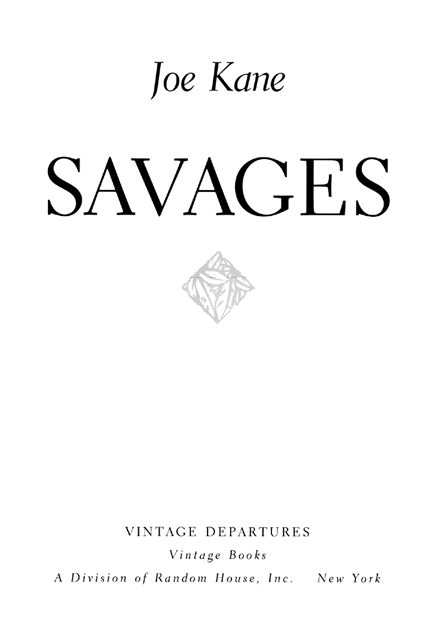Acclaim for JOE KANEs
SAVAGES
One of the years best books. Kane avoids alarmist generalizations and approaches the complexities of the situation with uncommon restraint and humility.
Voice Literary Supplement
As scathing as it is poignant and as informative as it is entertaining it has all the marks of an instant classic. Kane vividly evokes characters from every faction in the conflict, and lets readers decide for themselves who the savages really are.
Portland Oregonian
An absorbing environmental thriller.
The New Yorker
Kane teaches and delights with a tale that is half firsthand travelogue and half ecological thriller.
San Jose Mercury News
An insightful, poignant, and inspiring account, and a terrific book.
Peter Matthiessen, author of At Play in the Fields of the Lord
An uncommonly well researched and elegantly written account of [a] clash of cultures, free of sentimentality and romantic primitivism.
Manchester Guardian Weekly (London)
Kane crafts a crisp, compelling, and often hilarious narrative about the confrontation between the Huaorani and the modern world.
Details
A dark and comic adventure with magical characters and intricate twists of plot beautifully written. This is an important book as well as a good read: once I started Savages, I couldnt put it down.
Tracy Johnston, author of Shooting the Boh
JOE KANE
SAVAGES
Joe Kane was a member of the expedition that made the first complete navigation of the Amazon River; his book about that journey, Running the Amazon, was a New York Times bestseller. His writing about the Amazon for The New Yorker won the Overseas Press Club Award for environmental reporting and was nominated for a National Magazine Award. He lives in Oakland, California, with his wife, Elyse, and their daughters, Clare and Sophie.
BOOKS BY JOE KANE
Running the Amazon
Savages
FIRST VINTAGE BOOKS EDITION, AUGUST 1996
Copyright 1995, 1996 by Joe Kane
Photographs copyright 1995 by Zbigniew Bzdak
Map copyright 1995 by David Lindroth, Inc.
All rights reserved under International and Pan-American Copyright Conventions. Published in the United States by Vintage Books, a division of Random House, Inc., New York. Originally published in hardcover in slightly different form by Alfred A.
Knopf, Inc., New York, in 1995.
Portions of this book were originally published in The New Yorker in slightly different form as Amazon Showdown: A Stone Age Tribe Fights American Oil (9/27/93) and An Amazon Indian in D.C.s Jungle (5/2/94).
The Library of Congress has cataloged the Knopf edition as follows
Kane, Joe.
Savages / Joe Kane.1st ed.
p. cm.
Includes bibliographical references.
eISBN: 978-0-307-80991-9
1. Huaorani IndiansLand tenure. 2. Human ecologyEcuador. 3. Human ecologyAmazon River Valley. I. Title.
F 3722.1. H 83 K 36 1995
333.309811dc20 95-4258
Random House Web address: http://www.randomhouse.com/
v3.1
For Clare
Contents
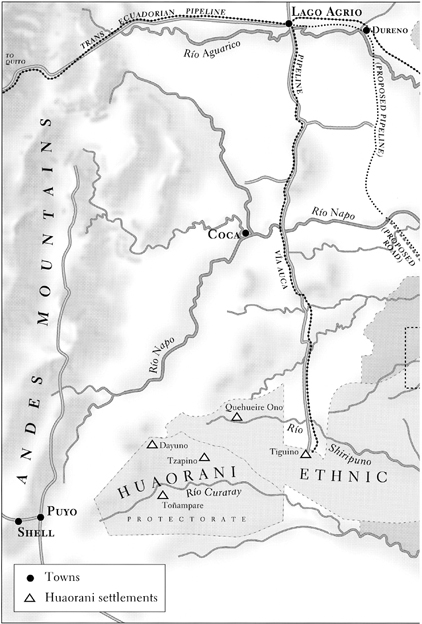
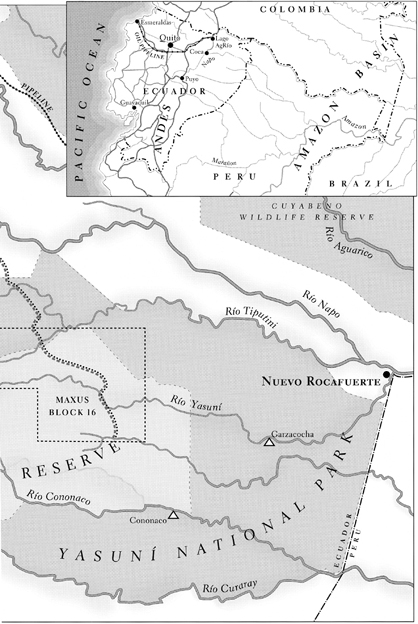
A Pronunciation Guide to Some Huaorani Names
| Amo: | ah-moe |
| Dayuma: | dye-oo-mah |
| Enqueri: | en-ker-ee |
| Mengatohue: | meng-gah-toe-way |
| Moi: | moy |
| Nanto: | nahn-toe |
| Quemperi: | kem-per-ee |
| Quimonca: | kee-mone-kah |
| Huao: | wow |
| Huaorani: | wow-rahn-ee |
| Quehueire Ono: | kay-way-i-ray oh-no |
| Toampare: | toe-nyahm-pahr-ee |
| Yohue: | yoe-way |
Prologue
T HOUGH MOI hit the streets of Washington, D.C., at the evening rush hour, he walked in the city as he does in the forestin slow, even strides. He kept his eyes to the ground and his knees bent, and he planted his broad feet deliberately, heel and toe, yet lightly as raindrops. It was the walk of a man accustomed to slippery terrain. I found myself stutter-stepping all the way down Pennsylvania Avenue, but Moi slid through the pedestrian horde like a fish parting water. He stopped only once, to study a squirrel climbing a maple tree: meat.
Moi wore dark khaki pants, a starched white dress shirt, a blue-and-gray striped tie, and brown leather shoes. The shoes were borrowed but the clothes were new, and though he was not entirely comfortable in them, he cut a handsome figure. Only the unusually high set of his cheekbones, the distinctive cut of his thick black hairstraight across his eyes, halfway down his backand the rack of shoulders that threatened to burst the seams of his shirt hinted at the distance Moi had come: His journey had begun deep in the Ecuadorian Amazon, in the homeland of his people, the Huaorani, a small but fearsome nation of hunter-gatherers who have lived in isolation for so long that they speak a language unrelated to any other on earth. It had taken Moi nearly two weeks to reach Washington. Traveling by foot, canoe, bus, rail, and air, he had crossed centuries.
Tucked into the small handwoven palm-string bag hed brought from home were his passport, his toothbrush, his bird-feather crown, and a letter addressed to the President of the United States of North America. The letter invited the president to visit the Huaorani. Moi wanted the president to explain to the People, as the Huaorani call themselves, exactly why it was that the United States of North America was trying to destroy them. The whole world must come and see how the Huaorani live well, the letter said. We live with the spirit of the jaguar. We do not want to be civilized by your missionaries or killed by your oil companies. Must the jaguar die so that you can have more contamination and television?
At the White House gate Moi reached into his bag and carefully removed his crown. It was made from owl, eagle, toucan, parrot, and wild turkey feathers, and when he jammed it down on his jet black hair a thousand colors seemed to burst from the plumes. But the gate was closed, and for a long time Moi stood and stared silently through the iron fence.
Then he said, That house looks pretty small. Are you sure the government lives here?
The president lives here, with his family.
Where are the soldiers? Are they underground?
Probably. And in back, and inside.
He gripped the fence, as if testing its strength, and his eyes narrowed in calculation: He went into the Huaorani zone, as Id come to think of it. When he returned he said, I believe I can climb this fence and reach the front door before the soldiers get me.
It will not work, Moi.
It will not work if I do not try.
The soldiers will be on you like a boa on a tree rat.




